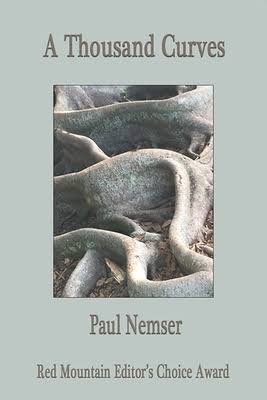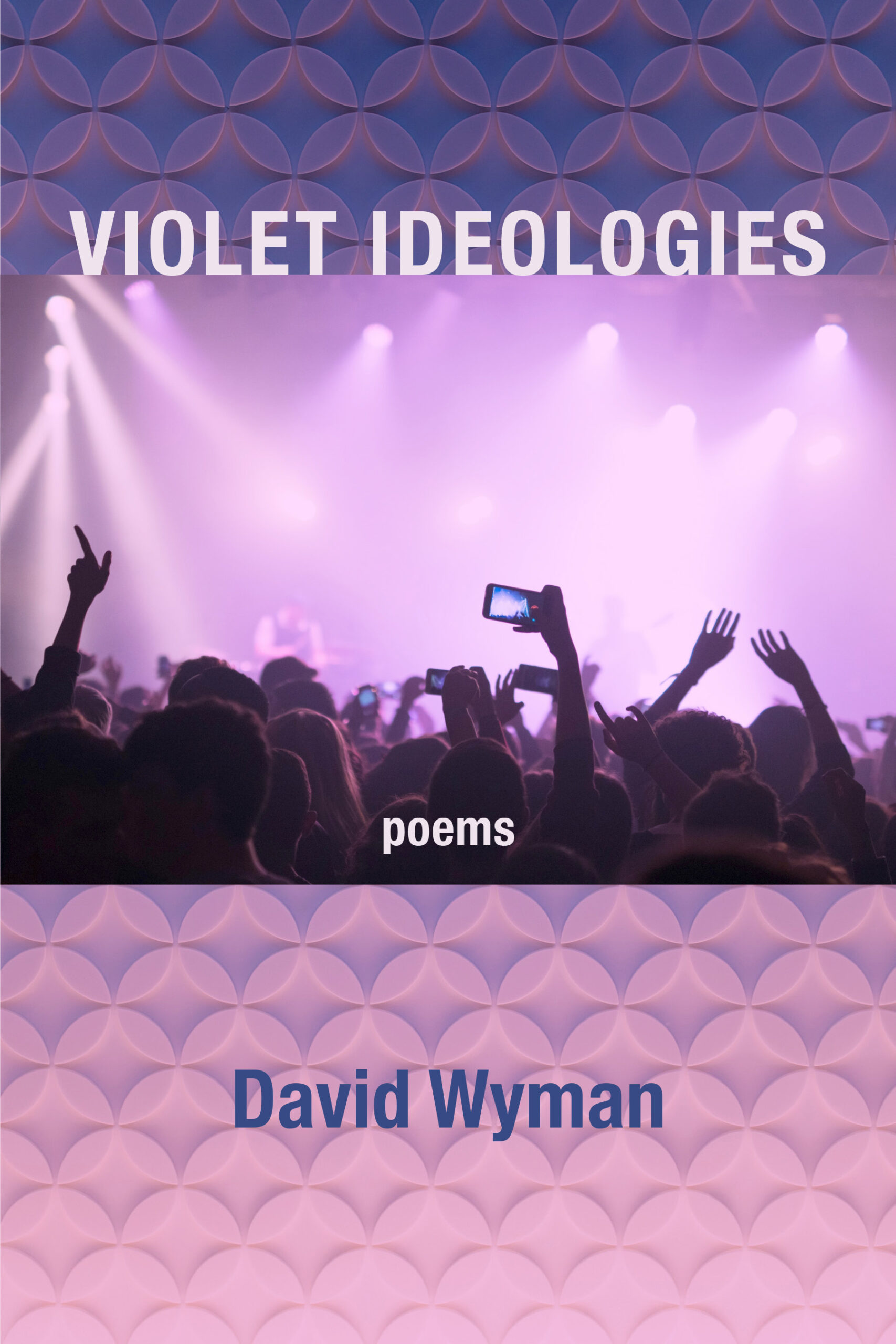
Out of Order can be ordered from the publisher:
https://mainstreetragbookstore.com/product-tag/howard-faerstein/
or purchased directly from Howard. If interested, write to hfaerstein@aol.com

Out of Order can be ordered from the publisher:
https://mainstreetragbookstore.com/product-tag/howard-faerstein/
or purchased directly from Howard. If interested, write to hfaerstein@aol.com

Paul Nemser’s new book A Thousand Curves, which is forthcoming in spring, 2021, won the Editor’s Choice Award from Red Mountain Press. The poems in A Thousand Curves find inspiration from nature, travel, mysticism, memory. Time is understood in glimpses—raindrops, tides changing, splashes of a waterfall. Sometimes the background leaps out of the foreground. Bugs grind leaves, a line from a rock song repeats and repeats. Here are ecstasies and nightmares, mysteries and clarities of daily life, fateful steps, chance encounters, donkeys braying, one nightingale calling, reflections off an office building’s floor-to-ceiling window. These glimpses can become a poem overnight or take decades to finish. In time the poems come together as a book that moves among traces of these myriad conversations. The internal speaks with the external. Permanence speaks with change. Ultimately the book is about the twists and turns that life takes over a lifetime, the record of a journey with a thousand curves.
“Paul Nemser’s A Thousand Curves contains many thousand brilliances—of language, of content, of perception—with each line indisputably in service to a larger wondering (Before this world,/we passed through clouds of others). Wild with insight and passion, these poems posit the marriage of body to world, flesh to thing, and exhibit an affinity for the beauty in the ordinary (Breathe in like screws turned in olive wood./Sigh out like milk-happy foals.) Most of all, these poems are visions from a grounded mystic, a speaker conversant with both the real and the mysterious, love and loss, this side of life and the other, and to experience the scope of this skill and ambition is thrilling. An immense and memorable achievement.”
–Joan Houlihan
“The particular pleasure of reading Paul Nemser’s poems emerges slowly, the reader paying close attention to the use of words, to the sophistication of form, until—suddenly—a cymbal crash that goes straight to the heart. We make our way, as Nemser writes in ‘After the Calm,’ ‘in weaves/of raspberries that thorn across fences fallen to gaps.’ Woven together are myths, impressions both internal and external, memories, and images. The greatest pleasure, though, at least for me, comes with the surprise of the line that shoots straight at and into us; and so, with clear eyes, we delight in, from ‘Morning After,’ ‘My pale, my pearl, my onions in a pan.’ Every one of Paul Nemser’s poems has its own surprises and its own rewards. Certainly, they engage the intellect, but time after time they open the heart.”
—Margery Irvine
About Paul Nemser
Paul Nemser grew up in Portland, Oregon, where he fell in love with poetry while reading in the storage room in back of his family’s tool store. He received an AB from Harvard College where he studied with Robert Lowell and Elizabeth Bishop, and an MFA in Writing from Columbia University School of the Arts where he studied with Stanley Kunitz and many others. He also received a JD from Boston University School of Law. His love of reading and writing poetry has continued throughout his life. Beside his new book, A Thousand Curves (Red Mountain Press, 2021), his book Taurus won the 2011 New American Poetry Prize from New American Press, and his chapbook Tales Of The Tetragrammaton (2014) was published by Mayapple Press. His poems appear widely in magazines, including AGNI, Beloit Poetry Journal, The Kenyon Review, London Review of Books, The Missouri Review, and Plume. He lives with his wife Rebecca in Cambridge, Massachusetts and Harborside, Maine.

Lisa DeSiro’s chapbook, Simple as a Sonnet, is now available from Kelsay Books.
A collection of poems about the ups and downs of modern love, this book was appropriately published just prior to Valentine’s Day. Copies can be purchased direct from the publisher (https://kelsaybooks.com/products/simple-as-a-sonnet) or on Bookshop (https://bookshop.org/books/simple-as-a-sonnet/9781952326943).

Helen Marie Casey’s new poetry chapbook, “You Kept Your Secrets”, is available from Finishing Line Press. Susan Edwards Richmond has written of the book: “In this deeply affecting collection, Helen Marie Casey chronicles the aftermath—and persistence—of loss in the absence of a beloved child. “What do we become when we cease to be/who we were?” the poet asks, a question that resonates for subject, author, and reader alike. These poems both celebrate a brief life, “you/young boy, hawk-like, spreading/your sweatered wings wide” and map the ever-widening circles of pain and joy.”

David Wyman’s poetry collection Violet Ideologies has been published by Kelsay Books. This is Wyman’s second book; his first, Proletariat Sunrise, came out on 2017, also from Kelsay Books. The poems express a dissident sensibility often exploring themes of our commodified identities in a culture subsumed by capitalism.
His poems have appeared in BlazeVOX, Dissident Voice, Zombie Logic Review, Clockwise Cat, Picaroon Poetry, The Voices Project, Squawk Back, Tuck Magazine, S/WORD and Genre: Urban Arts among other publications. He’s a fan of Noam Chomsky, jazz guitar and the visionary poetry of William Blake.
Violet Ideologies is available on the Kelsay Books website, on Amazon.com, Barnes&Noble.com, and Powells.com
Violet Ideologies, David Wyman’s second collection, lays out a brilliant spectrum of incongruous ideas. It’s ominous yet funny, apocalyptic but oddly serene, a splice of the beautiful and the monstrous. The result is “a binary like foxglove” where the language of Wall Street is grafted to the poetics of the natural world. It is a book for our times, when translating corporate-speak has become almost impossible and the day’s “official transcript gets redacted.” Ever get the feeling you’ve been cheated? Wyman asks and the answer is evident. Still, he won’t stop reminding us there is more to see than spread sheets and trendy electronica: horses gathered along a stone wall, a pub where poems taste like hard cider, songs sung to infants. Commodified language insists on a mandatory unity, even as lyricism escapes its confines again and again. Can the binary be broken? The book isn’t saying.
Lori Lamothe author of Kirlian Effect
In Violet Ideologies, “worn hearts/turn meaning into value.” Wyman knows that as sure as authority is constructed, “Landscape is temporary too.” Things are held in orbit by the caustic sting of pure feeling. It’s never a slow tectonics, but a rapidly shifting reality. Writing to “awakening/to an even greater understanding/of the inner dimensional self” is an uncomfortable benediction.
Jess Mynes author of One Anthem
As the translator of book three of the Copenhagen Trilogy, Dependency, Michael Favala Goldman was on the January 26 panel launch for this gripping memoir by Danish author Tove Ditlevsen. Fresh Air gave the Trilogy a rave review on NPR on Feb 3.
Below are the links to those two events and a recent podcast.
Michael Favala GoldmanPoet and Translator
PODCAST
FRESH AIR BOOK REVIEW, FEB 3, 2021
BOOK LAUNCH VIDEO

Mark Pawlak’s pandemic journal essay appears in this new issue of Arrowsmith magazine.
https://www.arrowsmithpress.com/pawlak-column

The Shape of the Keyhole by Denise Bergman
In 1650, in Massachusetts, a woman was falsely accused of killing her friend’s child. She was immediately tried and soon hanged. The Shape of the Keyhole examines a community’s fear-driven silence and envisions the innocent woman’s days as she awaits execution.
Praise for The Shape of the Keyhole
Denise Bergman’s compelling new collection, The Shape of the Keyhole, gives testimony to prejudices, false rumors, mutable scraps of damning evidence that wrongly condemn a woman to die by hanging. Here there is no restorative justice, only questions that singe through to a hushed past: “Why does no one ask why//she killed a child/would want to kill/ a child/that child//cold she not stop herself.” In a style reminiscent of cubism and Stein, Bergman’s fractured, repetitive language and succinct imagery recreate a sequence of voicings that imprint indelibly on the consciousness of the reader where “Silence snatches the best view of the finish line.” The Shape of the Keyhole shines a clarifying light into the dark, unsparing nature of humanity. —Dzvinia Orlowsky
Denise Bergman is the author of four other books of poetry: Three Hands None, A Woman in Pieces Crossed a Sea, The Telling, and Seeing Annie Sullivan. See denisebergman.com.
Black Lawrence Press, November 2020 ISBN: 978-1-62557-824-2 blacklawrencepress.com
This stunning book-length poem creates, from a brief account in colonial American history, an expansive collage of “dislodged sentiment, fragmented scenes, churned-up voices.” Bergman renders the arrest, trial, and execution of a falsely accused woman in cinematic slow motion and spare lyrical language, heightened by recurrent metaphor and contrapuntal word-play. A rush of voices speeds up the motion before the final scene, inviting questions of guilt and culpability that are disturbingly relevant to the injustices of our own time. —Martha Collins